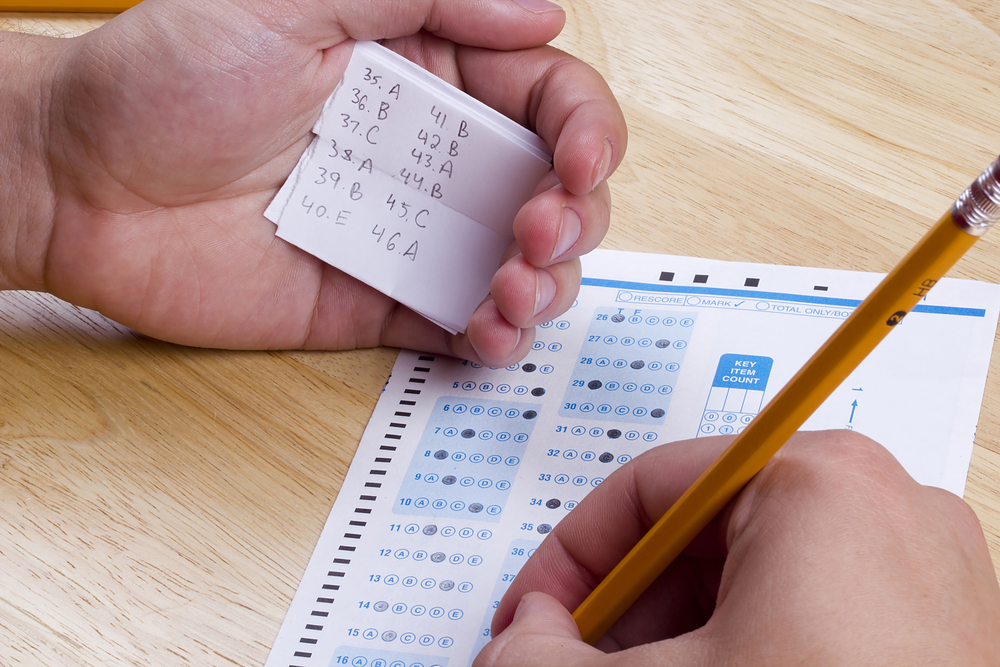by Erica L. Meltzer | Jun 5, 2016 | Blog, The New SAT
According to the chatter on College Confidential, some students are reporting that they received June SATs identical to their March tests.
At this point, it’s also common knowledge that Asian test-prep companies have been distributing the March test. Inevitably, then, some lucky students will have prepped for the June exam using…the June exam. (As if barring adults from non-released exams was ever going to prevent this sort of occurrence.)
This comes just as the College Board and Khan Academy announce that they have successfully leveled the playing field among test-takers.
The College Board has been in the habit of recycling tests for quite a while, but it would stand to reason that three months isn’t quite long enough to wait.
Somehow I don’t think this is what the College Board meant by “transparency.”
by Erica L. Meltzer | Jun 1, 2016 | Blog, Issues in Education, The New SAT
In the spring of 2015, when the College Board was field testing questions for rSAT, a student made an offhand remark to me that didn’t seem like much at the time but that stuck in my mind. She was a new student who had already taken the SAT twice, and somehow the topic of the Experimental section came up. She’d gotten a Reading section, rSAT-style.
“Omigod,” she said. “It was, like, the hardest thing ever. They had all these questions that asked you for evidence. It was just like the state test. It was horrible.”
My student lived in New Jersey, so the state test she was referring to was the PARCC.
Even then, I had a pretty good inkling of where the College Board was going with the new test, but the significance of her comment didn’t really hit me until a couple of months ago, when states suddenly starting switching from ACT to the SAT. I was poking around the internet, trying to find out more about Colorado’s abrupt and surprising decision to drop the ACT after 15 years, and I came across a couple of sources reporting that not only would rSAT replace the ACT, but it would replace PARCC as well. (more…)

by Erica L. Meltzer | Apr 6, 2016 | Blog, College Admissions, Issues in Education
If there’s one thing that everyone can agree on, it’s that college admissions is out of control. With schools posting new record-low acceptance rates each year, it’s hard not to wonder where things will end. Will Princeton soon have a 3% acceptance rate? Will Harvard dip below 2% Or, as Frank Bruni recently suggested in a satirical New York Times piece, will Stanford eventually boast that it did not accept a single student into its freshman class?
As long as students can apply to as many schools as they want with the click of a button, there’s nothing to suggest that the stampede for spots at a handful of elite schools will become any less intense; the fact that the vast majority of colleges in the United States accept over half of their applicants is no consolation to those seeking a spot at the top. With 40,000+ students clamoring for only a couple of thousands slots at places like Harvard and Stanford, and virtually no baseline criteria to deter weaker applicants, there’s no way for the process not to be stressful. (more…)

by Erica L. Meltzer | Apr 1, 2016 | Blog, The New SAT
As predicted, the College Board’s decision to bar tutors from the first administration of the new SAT had little effect on the security of the test; questions from the March 5th administration of the new SAT quickly made an appearance on various Chinese websites as well as College Confidential.
Reuters has now broken a major story detailing the SAT “cartels” that have sprung up in Asia, as well as the College Board’s inconsistent and lackluster response to what is clearly a serious and widespread problem.
It’s a two-part series, and it clearly takes the College Board to task for allowing the breaches. (more…)
by Erica L. Meltzer | Mar 29, 2016 | Blog
While writing my previous post, I happened to grab an 11th grade Common Core ELA Standard in order to illustrate the fact that rSAT is not in fact perfectly aligned with Common Core.
The standard is worded as follows:
Determine two or more central ideas of a text and analyze their development over the course of the text, including how they interact and build on one another to provide a complex analysis.
I initially just glanced over the standard (I had selected it at random to make a point), but when I read it carefully, I noticed something interesting about its construction — namely, that it doesn’t really say what it intends to say. In fact, it falls prey to a very common error: the misplaced modifier. (more…)
by Erica L. Meltzer | Mar 27, 2016 | Blog
As I’ve written about recently, the fact that the SAT has been altered from a predictive, college-aligned test to a test of skills associated with high school is one of the most overlooked changes in the discussion surrounding the new exam. Along with the elimination of ETS from the test-writing process, it signals just how radically the exam has been overhauled.
Although most discussions of the rSAT refer to the fact that the test is intended to be “more aligned with what students are doing in school,” the reality is that this alignment is an almost entirely new development rather than a “bringing back” of sorts. The implication — that the SAT was once intended to be aligned with a high school curriculum but has drifted away from that goal — is essentially false. (more…)

